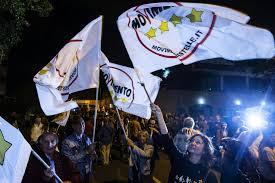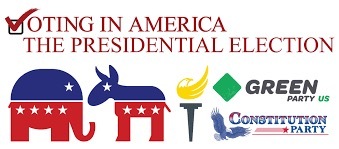The very first election I voted in was in 1979 and I remember well the excitement and thrill of getting to vote for the President of the United States. I know that may seem insignificant, but the right to vote was and is of great importance and not to be taken for granted. I don't take it lightly that I can and will be able to cast my singular vote for someone that will be the most prominent leader of the free world. And from someone that grew up around politics, I have a distinct and almost unapologetic sense of duty and responsibility to really consider the qualifications and concerns of the candidates. It was frustrating to watch the process of selecting the president in 2000 being turned over to the decision of the courts. Although I definitely acknowledge that the race should have never ended up so close to start with, it also showed that our political system needs to be reformed. Like so many on both sides of the aisle, I felt that we were not experiencing the efficient democratic process we had learned about in school.
And yet, here I am in Rome, Italy's capital, the land of political chaos and my second residence where I have lived on and off for the past 20 years. Italy has had more governments since the end of WWII than any other industrialized nation in the world. It is a country that has always been known more for its political intrigue, mafia and continuous corruption scandals than for its ability to get things done. That said, I am filled with a sense of unease and embarrassment because we are currently experiencing a parallel situation in the United States. As a foreigner and an American well versed in Italian politics, I could always present arguments in the past that despite our divided government and despite the general discontent that has permeated the political debate, we still had our democratic system, one that provided for an often prolonged and hyped season of debates, media madness and the rise and fall of political fortunes.
This year, all bets are off. This year, as an American, I no longer can occupy the higher ground in the debates on personal integrity and internationalism. I am feeling uneasy about everything; the process, the candidates, the media, the voters and the prospects for the future. In addition, lack of US leadership and direction and the mere "idea" of a Trump presidency has the European continent very worried. After decades of the US setting an example of international diplomacy and democracy, it is more than an embarrassment that America is no longer being viewed as a reliable role model to the world in the election process. Ironically, while our usually reliable and predictable political system is deteriorating, on the other side of the Atlantic, there are a few new and unexpected developments in the mayoral race in Rome and throughout Italy.
The "Five Star" party which started as an opposition movement against corruption in 2009 by comedian and entertainment personality, Beppe Grillo, was largely considered as nothing but a joke and not to be considered seriously by the Italian population at large. The party, mostly fueled by the new generation of younger voters who are tired of establishment candidates, has unexpectedly grown in power in the last 7 years and yesterday's election results ended in a surprise victory for Rome's first woman mayor, 37 year old Virginia Raggi. The city of Torino followed suit in electing female 5 star candidate 31 year old Chiara Appendino. It seems as if this non establishment party is well on its way to actually establishing itself as the primary opposition group in the country's national race in 2018. This is considered a direct and unexpected blow to Prime Minister Matteo Renzi's government which replaced Silvio Berlusconi's long and seemingly endless"reign" in 2014.
In the past, I would never have considered evaluating the European system of shorter and quicker elections and exploring the possibility that perhaps the United States ought to consider its own version of something comparable. Considering our present chaos in 2016 however, it is certainly worth considering a shortened and more condensed election cycle with less focus on big money in politics. If we didn't have 18 months to choose our leaders, we might find that voters would become more serious about focusing on the policies instead of the personalities, the impacts instead of the insults with hopefully the final objective of looking towards a positive outcome for us all and not just the income.
As an activist and someone that believes that social change can occur through conscious and well defined strategies of engagement, I think it is important that our systems continually be called into question. We should be evaluating ways of modifying old outdated rules which we may perceive to be the best or that we have become complacent about changing. Our objective should be to work with not only what is based on tradition and our past history of the election process, but also engage in a new practical, honest and introspective debate and review.
Take this most recent presidential primary season. Millions of people cast their votes, many for the first time, excited by one 'outsider' candidate or another. Yet, in the final analysis, for both parties, the decision was not what the voters wanted, but what a small and influential group of politically connected elected officials and large donors thought. In the case of the Republican party, it was clearly that of a system that favored candidates that were able to influence the media and the donors in the early days of the campaign. The Trump effect aside, the reality is that we are at the end of the primary and the individuals that are shaping the general election contest are the largest contributors, those that will be able to help fund what is going to end up being a billion-dollar campaign. On the Democratic side, the primary season ended on a sour note as the nominees argued over the so called "super delegates" and their influence on the process. Once again, a small group of individuals that will have the ultimate say in whom is eventually nominated to be the standard bearer for the party.
This brings me back to what I have experienced and seen in Europe for decades. It is also a innately flawed process that has its influencers, money brokers, corruption scandals and political intrigue. Despite recent new and inspiring developments I have just touched upon in Italy, the general population is still cynical that things will change and that corruption will be diminished. Old world cynicism and suspicions aside, it is possible however that European elections do offer some insights into ways to curb the overwhelming influence a small group of individuals and money can have. Whether it's the length of the election season, the involvement of more parties, holding the election on a weekend or mandatory registration, there may be some policies presently that we as a former colony of the European states could learn from. This is something that would not just improve the quality of the elections, but would potentially help us as a country to focus on issues rather than rhetoric and policy instead of posturing.
Here's to November 8th, it will not come soon enough.


